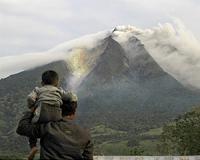| . |  |
. |
Keflavik, Iceland (AFP) Sept 16, 2010 A new volcano eruption on Iceland could happen again soon, but will likely wreak less havoc than the one that caused massive airspace shutdowns earlier this year, experts said Thursday. The Eyjafjoell eruption, which began on April 14 and spewed enough ash to cause the biggest European airspace shutdown since World War II, "was very unusual," Armann Hoskuldsson, a geologist at the University of Iceland, told an international conference in Keflavik, southwest of the capital. "Most volcano eruptions in Iceland are basaltic," with lava flows and spewing only coarse-grained and heavy particles, he explained. "That is what we would expect would happen in Katla," a much larger, neighbouring volcano that historically erupts within a year or so of Eyjafjoell, he said. The smaller Eyjafjoell volcano, whose ash cloud affected more than 100,000 flights and eight million passengers in April and May, was different, Hoskuldsson insisted. "The particles were so fine that they did not settle. They were absolutely not coming down, determined to go to Europe and bother your airspace," he pointed out. "For us in Iceland ... we don't deal with this kind of eruption except maybe once a century," he added. Other experts gathered at the Keflavik conference agreed that Iceland's next eruption would likely not have the same repercussions as Eyjafjoell. "No two volcanos are the same and no two eruptions are the same," said William Aspinall, a geophysicist at Britain's University of Bristol. For European airspace to suffer similar dire consequences as last time, the next eruption would need to be as explosive as the Eyjafjoell blast and meteorological conditions would need to be similar, he said. "The conditions have to be right. The volcano has to erupt at the right time, the wind has to blow in the right direction, stay in the right direction for a right amount of time to get the conditions we had" with Eyjafjoell, he told the Keflavik conference. While it is unlikely that so many factors would fall into place, Aspinall cautioned that the global response needed to be improved quickly. "For the UK, if we had a repeat of this it would be an absolute disaster if it happened in the next two years," he said, pointing out that another massive airspace shutdown could seriously disrupt the 2012 Olympics in Britain.
Share This Article With Planet Earth
Related Links Bringing Order To A World Of Disasters When the Earth Quakes A world of storm and tempest
 Indonesian volcano unleashes violent eruption
Indonesian volcano unleashes violent eruptionKabanjahe, Indonesia (AFP) Sept 7, 2010 An Indonesian volcano that returned to life after four centuries of inactivity threw an ash cloud thousands of metres into the air Tuesday in its most most violent eruption yet. Witnesses said lava, rock, ash and gas shot into the sky from the crater of 2,460-metre (8,000 feet) Mount Sinabung in northern Sumatra shortly after midnight. The eruption lasted five minutes and was felt about ... read more |
|
| The content herein, unless otherwise known to be public domain, are Copyright 1995-2010 - SpaceDaily. AFP and UPI Wire Stories are copyright Agence France-Presse and United Press International. ESA Portal Reports are copyright European Space Agency. All NASA sourced material is public domain. Additional copyrights may apply in whole or part to other bona fide parties. Advertising does not imply endorsement,agreement or approval of any opinions, statements or information provided by SpaceDaily on any Web page published or hosted by SpaceDaily. Privacy Statement |